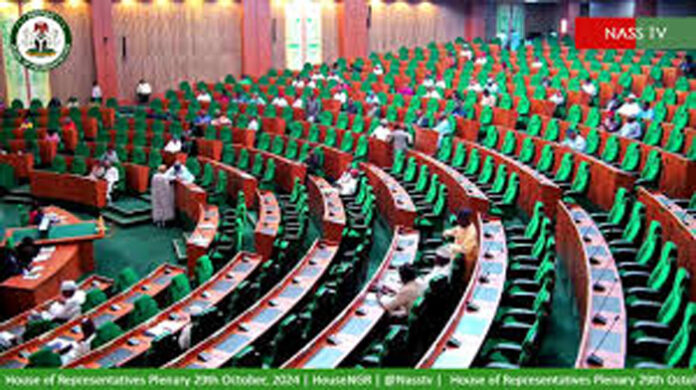A heated argument erupted on the floor of the House of Representatives on Tuesday over which committee has the mandate to investigate the alleged irregular allocation and management of the Lagos International Trade Fair Complex the Committee on Public Assets or the Committee on Commerce.
This followed a motion of urgent public importance by Hon Ademorin Kuye who called for an investigation into alleged illegal sale of government assets at the Trade Fair Complex.
In his motion, he proposed that the House Commitee on Public Asset should handle the investigation.
However, the Chairman of the House Commitee on Rules and Business, Francis Waive raised a Point of Order, drawing the attention of House to the point that the motion in question fell within the mandate of the Commitee on Commerce.
This Point of Order led to back and forth debate, as lawmakers argued over which committee should chair the investigation between the Committee on Public Assets and Commerce.
The disagreement continued as Hon. Yusuf Adamu Gagdi (APC, Plateau) raised a point of order citing Order 109, Rule 1 and 2 of the House Standing Rules, which, according to him, gives the Committee on Public Assets jurisdiction over all government properties, including those situated within and outside the country.
Gagdi argued that since the Lagos Trade Fair Complex is a public property of the Federal Government, oversight responsibility rests with the Committee on Public Assets.
“If you check Order 109, it clearly states that the Committee on Public Assets oversees ministries and agencies charged with the management and disposal of public assets. The Lagos Trade Fair is one of such public assets,” Gagdi said.
However, Hon. Mark Esset (PDP, Akwa Ibom) disagreed, insisting that the Trade Fair Complex falls under the purview of the Committee on Commerce.
“Trade fair is not a public asset being sold. It is a commercial entity, and the House Rules on page 153 clearly list it under the functions of the Committee on Commerce. If the House has made a mistake by its earlier decision, we have the powers to reverse it,” Esset maintained.
Amid the back-and-forth, Hon. Ali Isa J.C. (PDP, Gombe) appealed for caution, urging members to follow due process and respect the guidance of the Rules and Business Committee. He proposed that a joint committee be formed, with the Committee on Commerce taking the lead while Public Assets and other relevant committees participate.
But the suggestion failed to gain traction as it was not seconded.
Hon. Gaza Jonathan Gbefwi (SDP, Nasarawa) later intervened, backing the idea of a joint committee but with the Committee on Public Assets taking the lead role, given that the matter involved the ownership and possible sale of federal property.
“Since it has to do with the premises and land, which are federal assets, Public Assets should lead the investigation, while Commerce can support since the activities there relate to trade fairs,” Gbefwi suggested.
Adding to the controversy, the Deputy Chairman of the Committee on Commerce, Hon. James Shai Wubarka (PDP, Taraba), revealed that his committee had already begun oversight visits to the Lagos Trade Fair Complex.
“We have visited the complex twice on this same issue and are already on top of it. To now reassign the matter to another committee would amount to taking away our responsibility,” he stated.
As the tension rose, the Speaker intervened to restore order, clarifying that the motion before the House concerned the allocation of premises where trade fair activities take place, not the commercial operations themselves.
After several points of order and counter-arguments, the Speaker ruled that, to resolve the impasse, an ad hoc committee comprising members of both Public Assets and Commerce Committees would be constituted to investigate the matter jointly.
“It’s only an investigation. To bridge the divide between both committees, we will have an ad hoc committee involving members from both sides to handle it,” the Speaker ruled.
However, the arguments continued among lawmakers.
Eventually, when the main motion was put to a voice vote, lawmakers rejected the motion with nay, leading to further rowdy session, with the presiding Deputy Speaker struggling to calm down the situation. The House later dissolved into an executive session to resolve the issue.

